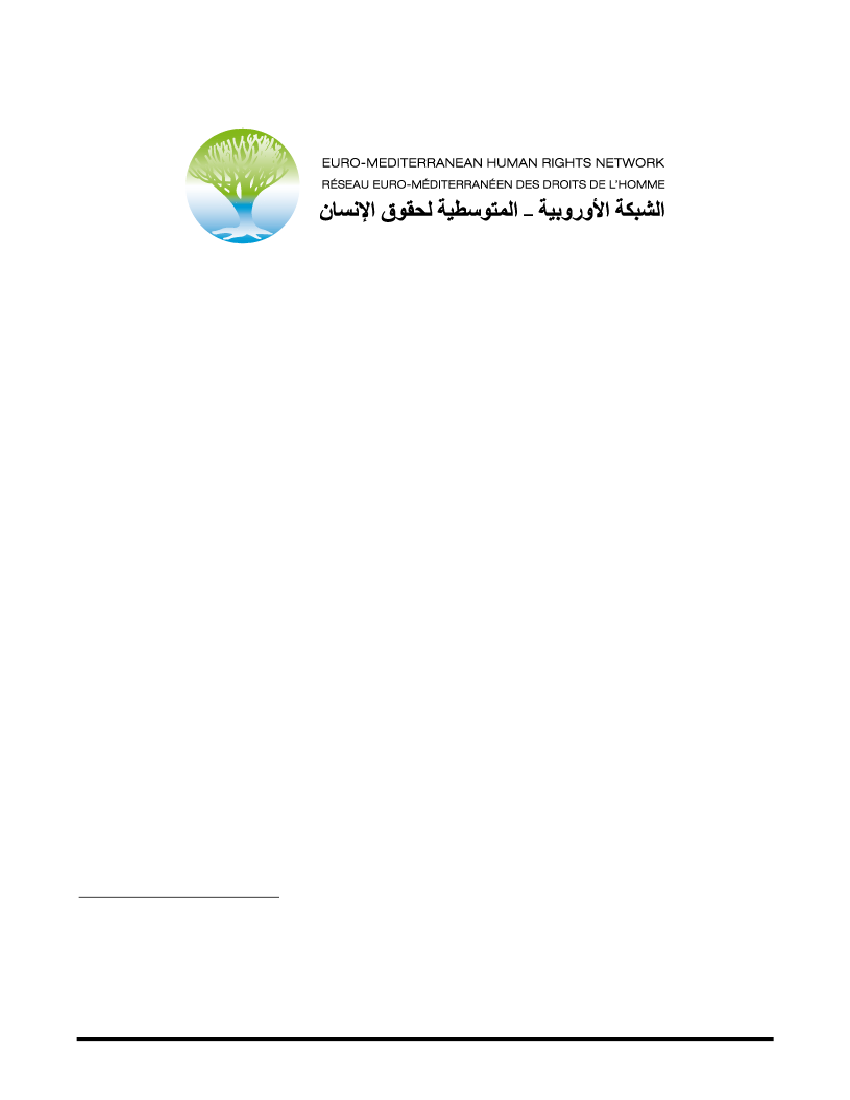Udenrigsudvalget 2011-12
URU Alm.del Bilag 71
Offentligt



EMHRN STATEMENT5 December 2011The EMHRN urges the European Union to fully integrate gender equality in the “renewed ENPpolicy” with its Southern NeighboursDuring a 3-day mission to the EU institutions1in Brussels on 21-23 November 2011, a delegationof the Euro-Mediterranean Human Rights Network (EMHRN) composed of representatives ofwomen’s rights organisations from Egypt, Morocco, Algeria and Jordan, voiced serious concernsthat Gender Equality is almost absent in the new EU approach towards its Neighbouring countries2and stressed the lack of gender mainstreaming of this approach.The EMHRN delegation regretted that, in its definition, the EU concept of “deep democracy” failedto enshrine women’s rights and full equal participation of women. The delegation furtherdenounced that the concept showcased no clear benchmarks to tackle the pivotal role of women’sequal political participation in terms of democratic transition. It urged the EU to redress this gapwhich was acknowledged by several EU officials and to add gender equality in the “deepdemocracy” criteria in future EU statements or Conclusions and at the implementation stage.Following the meetings the Council underlined in its Conclusions of 1 December (add reference infootnote) that “women’s rights, gender equality and women’s participation in the political processare essential components of a democratic society and important for inclusive economicdevelopment”. The EMHRN welcomes this step and calls on the EU to translate this statement intoconcrete action and gender mainstreaming at all levels of relations with South Mediterraneancountries, including political dialogues, ENP progress reports, actions plans, benchmarks,programs and criteria for the EU “more for more” approach. In meetings with representatives ofthe EU institutions, members of the EMHRN delegation explained the situation of gender-baseddiscrimination and gave an overview of the situation of women and the obstacles to their activeparticipation in these countries, with a particularly sharp focus on times of political transition andreforms.
1
Meetings with European External Action Service, European Parliament, European Commission and EU Member States’representatives.2
“A new response to a changing Neighborhood” issued by the High Representative of the Union for the Foreign Affairsand Security Policy and the European Commission in May 2011
Euro-Mediterranean Human Rights Network. Vestergade 14-16, 2 floor. DK-1456 Copenhagen KFax: +45 32 64 17 02 + 45 32 64 17 00 نوفيلت
nd
3/2More specifically, the delegation members detailed the situation of Algerian women who are beingsubjected to discriminatory laws (i.e. the family law and other laws) and who areunderrepresented both in the public and political spheres. Independent Algerian women’s rightsorganisations are also regularly hindered when they are trying to hold in-country activities due tothe lack of freedom of association and assembly in the country.As far as Egyptian women are concerned, the delegation updated EU officials on the systematicmarginalisation of women’s participation in the political transition process. The delegation alsoemphasised the fact that gender equality, non-discrimination and positive actions were nowhereto be seen on the agenda of the current transitional government. Recent cases of femaledemonstrators who went though virginity tests ordered by the Egyptian police (an act thatqualifies as sexual abuse), have been documented by the media and strongly condemned by theinternational civil society.Furthermore, human rights organisations operating in Egypt are harassed and subjected to densedefamation campaigns due to their documenting and publicising of human rights violations by theSecurity Council of Armed Forces.With regards to the Jordanian situation, the delegation highlighted that no explicit gender equalitywas mentioned in the new constitutional amendments that took place recently in Jordan. Whilewomen were underrepresented in the National Dialogue Committee, not a single woman was to befound in the composition of the Royal Committee for Constitution Amendments. Jordanian womenmarried to foreigners organised many sit-ins in front of the Parliament during the last months, inprotest against discrimination in relation to passing on their nationality to their husbands andchildren, in a bid to claim their rights as full citizens. The Delegation members note that this isalso a problem in some other countries of the region.In Morocco, the Constitution put to referendum in July 2011 enshrines equality between womenand men in terms of their civil, political, economic, social, cultural, and environmental rights, andreasserts the State’s commitment to attaining male-female parity.However, the first implementation of the egalitarian provisions related to political participation,stemming from the organic law on the Chamber of Representatives, has already failed in thisregard with women representing a mere 16% of the new Parliament elected on 25 November. Wethus remain far from the 30% quota and from true male-female parity. The lack of harmonizationbetween the provisions of the organic laws and the provisions of the Constitution beg the questionof whether there is a real willingness to implement the Constitution. Moreover, the family code,penal code, and work code all continue to constitute a discriminatory approach with regards towomen’s rights and their full and entire participation to public life.In conclusion, the EMHRN urges the High Representative of the Union for the Foreign Affairs andSecurity Policy, EU Member States and the European Commission to step up their support forwomen’s rights and gender equality in the Mediterranean region based on commitments taken byall euro-Mediterranean countries in the 2006 Istanbul and 2009 Marrakech Ministerial Conferenceson Strengthening the role of women in society3.In particular, the EMHRN exhorts the EU to comply with the following:
3
http://www.eeas.europa.eu/euromed/women/docs/2009_11_conference_en.pdf
Euro-Mediterranean Human Rights Network. Vestergade 14-16, 2 floor. DK-1456 Copenhagen KFax: +45 32 64 17 02 + 45 32 64 17 00 نوفيلت
nd
3/31. Systematically integrating gender equality as a guiding principle in all aspects of itsbilateral relations with countries of the Southern and Eastern Mediterranean region.2. Systematically mainstreaming the gender dimension across follow-up and implementationof the EU’s “newresponse to a changing Neighborhood”3. Explicitly add equal participation of women in political and public life in the EuropeanNeighborhood Policy (ENP) “deep democracy” benchmarks4. Including gender related benchmarks in the EU annual country progress reports on whichEU support will be based as well as all revised or future ENP Action Plans, such as:constitutionalisation of gender equality and non discrimination based on gender, lifting ofreservations to CEDAW, signing of CEDAW Protocol, abolishing discriminatory articles,establishing parity in electoral laws and processes and other positive actions orientedtowards the promotion of gender equality and the eradication of gender-baseddiscrimination.Contacts:In Amman:Lina Al Qurah
Director of the Gender projectE-mail: [email protected]In Brussels:Sandrine Grenier
Advocacy DirectorTel : 00 32 / (0)2 513 37 97Email: [email protected]
Euro-Mediterranean Human Rights Network. Vestergade 14-16, 2 floor. DK-1456 Copenhagen KFax: +45 32 64 17 02 + 45 32 64 17 00 نوفيلت
nd



